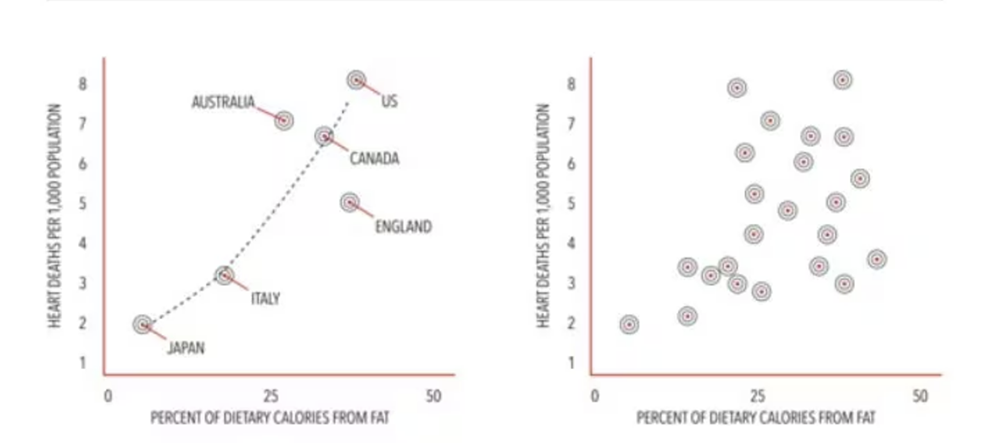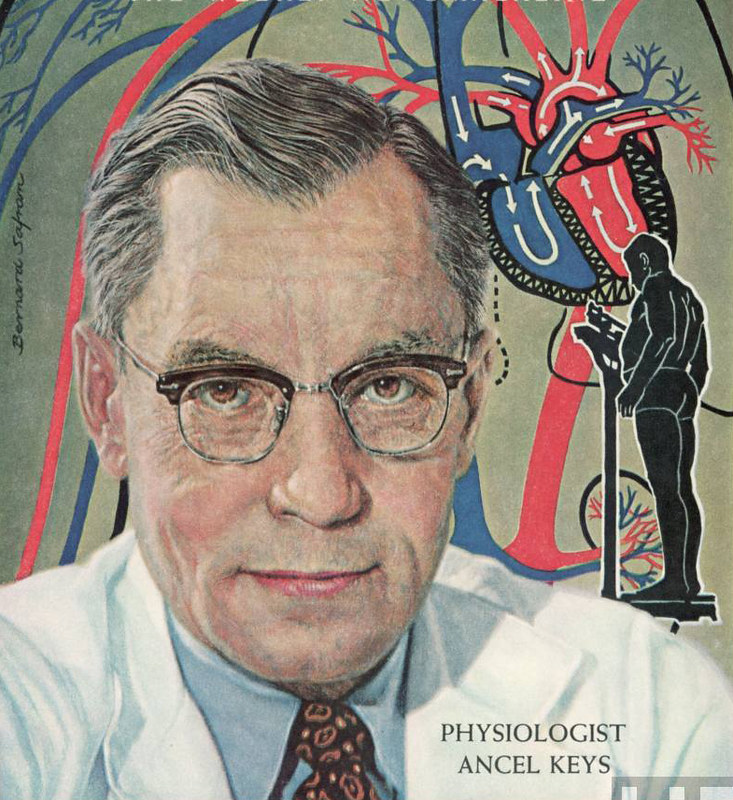No, not Genghis Khan, Mao Tse Tung or Joseph Stalin. They were beginners and only killed a few tens of millions. I’m talking about an American doctor, Ancel Keys. He killed or shortened the lives of hundreds of millions, possibly billions, over the space of 50 years.
Who he?
Keys is the man who saddled us with the fake science claiming that saturated fats kill and sugar was NOT the culprit. He did not simply make a mistake; he criminally FAKED his results. For why? Because he was paid to lie, as a supposed scientist in pursuit of the truth.
That’s what I have against him. Heck, you could even claim that Genghis Khan was just “doing his job” (aggressive head of state). But Ancel Keys set out cynically and deliberately to hurt Mankind by steering medicine in the wrong direction.
He was paid by the sugar industry to deflect attention from the manifold dangers of invert sugar, which is one of the deadliest, most inflammatory food substances known. It underlies modern metabolic disorders, from obesity, to diabetes.1
Prof. John Yudkin, who wrote the awesome book Pure White and Deadly, assembled masses of demographic figures proving conclusively that sugar was a VERY BAD THING and the industry wanted him GONE. Keys set out to demolish Yudkin and his legacy.
The current trend to blame seed oils and omega-6 PUFAs, notably linoleic acid, is laudable in its way but it in no wise means that we were wrong about sugar. It remains a deadly dietary player.
Whereas fat, which Keys targeted, is not only not the problem but is an important dietary need and keeps us healthy.
So we got the current soaring debacle of health, where millions are going down with heart disease, diabetes, stroke and dementias. Yes, dementias. We currently have an epidemic of dementias, since the introduction of low-fat diets in the 1970s. Guess what? The brain is 60% fat, so for low-fat diet, read low-brain diet.
How did he do it?
Keys Conniving With Commerce for His Thirty Pieces of Silver
Keys won the battle with Yudkin (which was totally rigged by corrupt dollars) and Keys became nutritional dogma. The way he faked it was to pick only countries that illustrated his point. The rest were ignored.
Keys collected data on deaths from coronary heart disease and fat consumption from 22 countries but he cherry-picked the data from only the 7 countries which supported his theory that animal fat was the main cause of coronary heart disease. The results of what later became known as the “Seven Countries Study” appeared to show that saturated fat in the diet was strongly related to coronary heart disease mortality both at the population and at the individual level.
The title itself is a fraud: it was actually a 22 countries study! Here’s the truth:
The graph on the left was what Keys published. It looks quite convincing: the more fat you ate, the more certain you would have a fatal heart attack. The graph on the right includes all the data Keys had and, as you can see, there is no real pattern. Yikes!
In fact if you took the results from just Finland, Israel, Netherlands, Germany, Switzerland, France, and Sweden, the exact opposite would have been found: that fat in the diet protects against heart disease.
But history enshrined Ancel Keys as a virtual folk hero. He even had a picture on the cover of Time magazine (1961), a slot usually reserved for celebrities, politicians and heroes (like Taylor Swift??)
Meanwhile, John Yudkin lost his post, his career was damaged by the food industry and prominent nutritionists who tried to destroy his reputation. He was ostracized by his college at the University of London and vilified in the scientific press.
Oh, and did I mention: hundreds of millions died of the false dogma, which continues to this day.
Cristin Kearns discovered by chance secret documents of the Sugar Industry in which its campaigns, lies and deceptions are collected since the 1970s. She contacted Gary Taubes, and together they published the whole truth in Mother Jones magazine.
The official Journal of the American Medical Association (JAMA) publishes an influential study linking sugar consumption to the risk of death from cardiovascular diseases 40 years after Yudkin did.2
Fortunately, it’s gradually becoming recognized that Keys cooked his data. But incredibly he still has his admirers and defenders, which I typically rate as those who supported the phoney cholesterol myth and refuse to admit they were wrong; an all-too-human quirk.
But there was evidence Keys was wrong, damnably wrong, even before the famous seven countries study.
For example, recently an unpublished 56 month randomized study of 9,423 adults living in state mental hospitals or a nursing home (which made it possible to rigidly control their diets) was unearthed.
This study, which Keys was the lead investigator of, found that replacing half of one’s animal (saturated) fats with seed oil (e.g., corn oil) lowered their cholesterol, but for every 30 points it dropped, their risk of death increased by 22% (which roughly translates to each 1% drop in cholesterol raising the risk of death by 1%).3
Note: The author who unearthed that study also discovered another (unpublished) study from the 1970s of 458 Australians, which found that replacing some of their saturated fat with seed oils increased their risk of dying by 17.6%.4
Likewise, recently, one of the most prestigious medical journals in the world published internal sugar industry documents.5
They showed the sugar industry had used bribes to make scientists place the blame for heart disease on fat so Yudkin’s work would not threaten the sugar industry.6
In turn, it is now generally accepted that Yudkin was right, but nonetheless, our medical guidelines are still largely based on Key’s work.
However, despite a significant amount of data that now shows lowering cholesterol is not associated with a reduction in heart disease, the need to lower cholesterol is still a dogma within cardiology. For example, how many of you have heard of this 1986 study of older patients which was published in the Lancet which concluded:
“During 10 years of follow-up from December 1, 1986, to October 1, 1996, a total of 642 participants died. Each 1 mmol/L increase in total cholesterol corresponded to a 15% decrease in mortality (risk ratio 0 to 85 [95% Cl 0·79 to 0·91]).”7
And this:
For half a century, a high level of total cholesterol (TC) or low-density lipoprotein cholesterol (LDL-C) has been considered to be the major cause of atherosclerosis and cardiovascular disease (CVD), and statin treatment has been widely promoted for cardiovascular prevention. However, there is an increasing understanding that the mechanisms are more complicated and that statin treatment, in particular when used as primary prevention, is of doubtful benefit.
Expert commentary: Our search for falsifications of the cholesterol hypothesis confirms that it is unable to satisfy any of the Bradford Hill criteria* for causality and that the conclusions of the authors of the three reviews are based on misleading statistics, exclusion of unsuccessful trials and by ignoring numerous contradictory observations.8
*Association does not equal causation, as we are accustomed to hearing. That doesn’t mean we have to dump all such potential evidence. It COULD be correct to draw a causative relation. In 1965 Sir Austin Bradford Hill first proposed 9 criteria that would help strengthen the causality. Here are the first 6, for your understanding. I think only an epidemiologist would need all!
Strength of association: The stronger the association, the more likely it is causal.
Consistency: The same findings should be observed in different populations, study designs, and times.
Specificity: There should be a one-to-one relationship between the cause and outcome.
Temporal sequence: Exposure should precede outcome.
Biological gradient: Changes in disease rates should correspond to changes in exposure.
Biological plausibility: There should be a potential biological mechanism.
Sir Austin Bradford Hill CBE FRS was a British epidemiologist who pioneered the modern randomized clinical trial and, together with Richard Doll, demonstrated the connection between cigarette smoking and lung cancer.
Well, I hope that got you thinking!
Eat well and don’t die before your time!
To Your Good Health,
Prof. Keith Scott-Mumby
The Official Alternative Doctor
Final Note: You know what really pees me off? Ancel Keys went to live in Calabria, a region in southern Italy famous for the longevity of its population, and he lived to over 100 years. Yet people are still dying younger than they should of his dogma and the so-called cholesterol myth.
Spare a little thought for John Yudkin in your prayers tonight: he worked to help humanity and was destroyed. Ancel Keys worked to destroy the truth and lived to over 100! Go figure…
BTW I know why Keys lived so long! There’s a secret to the Calabrian longevity miracle; it’s Bergamot juice and I’ve got some.
References
- https://www.nytimes.com/2016/09/13/well/eat/how-the-sugar-industry-shifted-blame-to-fat.html
- Kearns CE, Schmidt LA, Glantz SA. Sugar Industry and Coronary Heart Disease Research: A Historical Analysis of Internal Industry Documents. JAMA Intern Med.2016;176(11):1680–1685. doi:10.1001/jamainternmed.2016.5394
- https://www.statnews.com/2016/04/12/unearthed-data-challenge-dietary-advice/
- BMJ 2013;346:e8707
- JAMA Intern Med. 2016;176(11):1680–1685. doi:10.1001/jamainternmed.2016.5394
- https://www.npr.org/sections/thetwo-way/2016/09/13/493739074/50-years-ago-sugar-industry-quietly-paid-scientists-to-point-blame-at-fat
- Volume 350, Issue 9085p1119-1123October 18, 1997
- Expert Review of Clinical Pharmacology, 11(10), 959–970. https://doi.org/10.1080/17512433.2018.1519391






